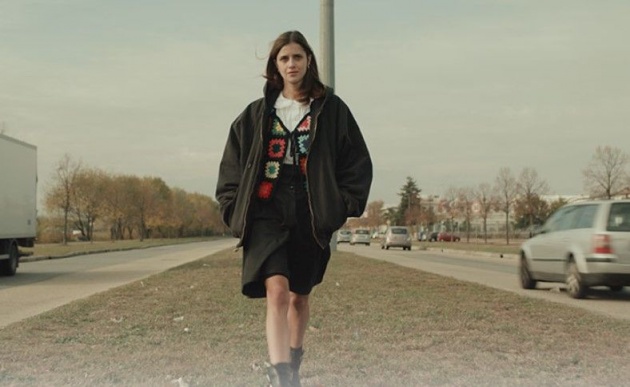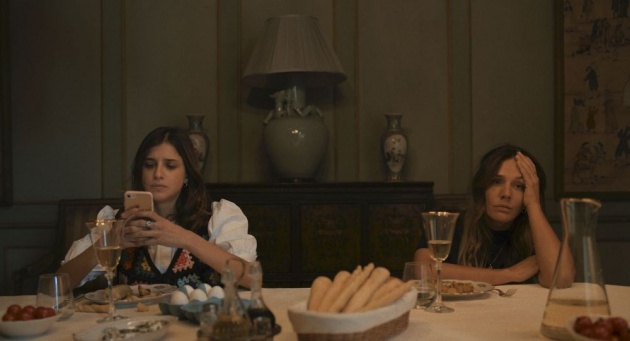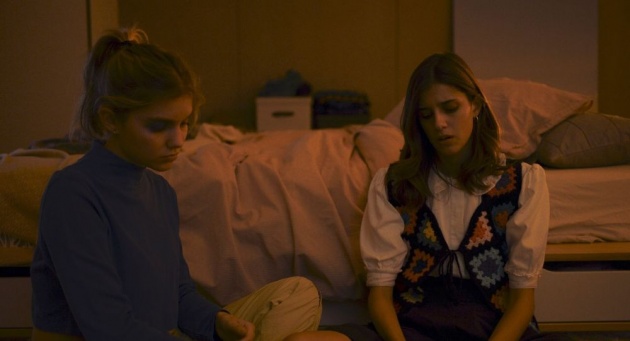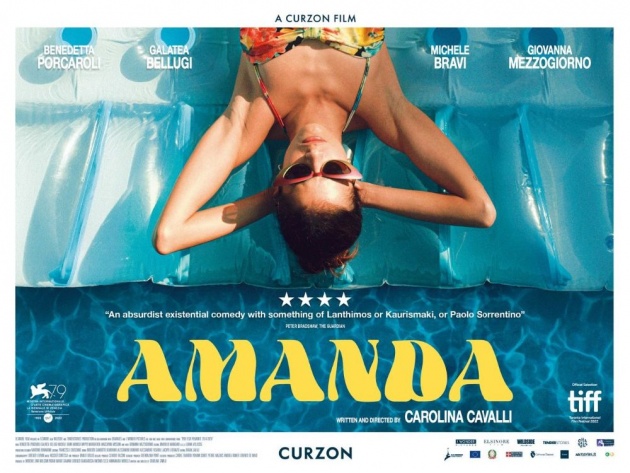
Pictured: Not heading for a 'Dance and Destroy' techno rave, Amanda (Benedetta Porcaroli) strides purposefully on in a scene from the Italian comedy film, 'Amanda', written and directed by Carolina Cavalli. Still courtesy of Curzon Film Distribution (UK)
Italian writer-director Carolina Cavalli redefines the female mental health film in her appealing, though not to all tastes, feature debut, Amanda. Featuring an intense central performance by Benedetta Porcaroli in the title role, it is a comedy about the need to connect, specifically a young woman who yearns to be noticed quivering in the face of attention.
The film begins with young Amanda clutching a box of cereal whilst lying on a sun lounger in the middle of her family’s pool. On the side of the pool, her older sister, Marina is sunbathing. Sensing that she is almost invisible, or perhaps testing the response to her narcissism, Amanda tips her sun lounger over. Just as she does this, the family’s Latin American maid, appears with a tray bearing lemonade and glasses, which she promptly drops. Now an adult, Amanda reflects on an encounter in a cinema in which she and a male cinemagoer lock eyes. She waits for him. He looks at her. Nothing happens. ‘That was five years ago,’ cries Amanda on a lunch date with Marina (Margherita Missoni). ‘I could have had a boyfriend for five years.’ She couldn’t take him home because who does that on a first date? Though their family has a successful pharmacy business – ‘we are like circuses, only pharmacies’, Amanda explains – she doesn’t work in one. She only once popped it to get a chap stick for free. Recently returned from Paris, Amanda lives in an apartment near to a hotel, which her parents pay for. Amanda is often framed walking past, the hotel sign in block capitals viewed in reverse so that the ‘E’ and ‘L’ are backwards; the film is very much about a backward ‘elle’. Independent living does not stop her visiting her parents for dinner, or even leaving the house with a plate full of rice. Marina finds Amanda tiresome. Only Amanda’s young Jesus-obsessed niece likes her. Amanda talks to her about a boy her niece liked who went to a different camp for the summer. The boy’s parents chose for him to go to an all-boys camp. ‘You don’t want to go out with a boy told what to do by his mother,’ she remarks. ‘He’s eight,’ cries Marina, who resents being asked to switch seats with her niece. Amanda’s mother suggests that Amanda reconnect with a childhood friend, Rebecca (Galatéa Bellugi), an accomplished young woman who was good at sports and wants (according to her mother) to become a lawyer. The problem is that Rebecca is more dysfunctional than Amanda.
Superficially, it is possible to read Amanda as a satire of the Italian bourgeoisie, with both Amanda and Rebecca affected by a malaise. However, their problems are clearly signposted as mental illness – in Rebecca’s case, late onset agoraphobia, perhaps brought on by a trauma (we learn that she hates parties). Both young women are socially inept.
Cavalli’s film has a seemingly endless stream of quirkiness. Amanda is very attached to her maid. Although having told her Siri-like mobile phone app, that refers to Amanda as ‘sexy mama’, that she is heading for ‘Dance and Destroy’ techno rave, she ends up at a party for the maid’s nephew. The app advises her to change direction. Amanda isn’t welcome, though the maid offers her a slice of cake. Standing between Amanda and the maid is a young boy, who slips over his own football. Amanda’s attachment to the maid is reflected through her multi-coloured waistcoat, that looks like an article of clothing worn by indigenous Peruvians. The waistcoat marks Amanda out as uncool – the opposite of stylish.
Amanda has another compulsion – to visit a horse that is kept outside. Amanda identifies with it, tethered and lonely. Amanda herself has an animal-like stare, fixed, betraying little. When the horse’s owners, a husband and wife, confront Amanda, telling her to go away, Amanda stands her ground. Superficially, she has no boundaries and has schemes that only make sense to her, like buying multiple cans of energy drinks to acquire an electric fan, which she then intends to sell as she needs the money. She even goes shopping with her sister to collect points, but then forgets to ask for them.#

Pictured: Amanda (Benedetta Porcaroli) and her sister Marina (Margherita Missoni) in a scene from the Italian comedy, 'Amanda', written and directed by Carolina Cavalli. Still courtesy of Curzon Film Distribution (UK)
Rebecca’s mother welcomes Amanda into her home. Rebecca, confining herself to her room, slams the door on her. This makes Amanda more determined, sitting outside her room drinking multiple energy drinks and eating the food Rebecca’s mother leaves for her daughter. Watching Amanda take a bite, Rebecca is aghast. Amanda comes up with a plan to get into Rebecca’s room – to pour an energy drink over her book and then blame Rebecca for it. Rebecca sees the mess. ‘I didn’t do it,’ she tells Amanda. ‘If I say you did it, Amanda cries, ‘then you did it.’ Rebecca offers to dry the book and finally admits Amanda into her room. She instructs Amanda not to touch her trophies. ‘What trophies?’ Rebecca takes them out of a box to show her. In doing so, she demonstrates her own narcissism.
In a subplot, Amanda hangs outside a techno nightclub and stares at a man opposite. He approaches her, but not before Amanda lends her phone to a girl who asks to make a call. ‘Aren’t you afraid I’ll run off with it?’ the girl asks, amazed that she is trusted. ‘No,’ replies Amanda. The man asks why he is staring at her. ‘You’re a drug dealer,’ says Amanda. ‘You have drug dealer shoes.’ ‘What kind of shoes are those?’ The young woman returns Amanda’s phone and observes the conversation. We discover that that the man gives out free condoms. Amanda asks him if they can go somewhere. The man drives her to a café. ‘I saw a deer on this road,’ he tells Amanda, whilst driving. ‘Most girls are impressed by that.’ ‘It’s not much of a story,’ replies Amanda. ‘What? I should say that I saw a deer, and then got out of the car?’ ‘A story is set of interconnected events,’ explains Amanda. ‘I like the story,’ says the young woman who has been sitting in the backseat all along. She stays to observe their meal. Amanda refuses a lift home, leaving the man with the girl, who again says nothing. Amanda believes it is the beginning of something. It is, but not with her, even though Amanda texts him ten times a day.
Slowly Amanda breaks down Rebecca’s reserve, though not before hearing that the two girls were separated as children by their parents. Amanda frames herself as a victim of circumstance. If only she and Rebecca hadn’t been apart. Rebecca leaves her room. The two young women ignite fireworks. Rebecca’s mother is shocked. ‘I thought you were shooting each other,’ she cries.

Pictured: Rebecca (Galatéa Bellugi, left) and Amanda (Benedetta Porcaroli, right) get to know each other in a scene from the Italian comedy-drama, 'Amanda', written and directed by Carolina Cavalli. Still courtesy of Curzon Film Distribution (UK)
There is an obstacle to their friendship – Ann, Rebecca’s psychiatrist. Amanda is told that she cannot go into Rebecca’s room while she is being treated. Ann is slightly older than Amanda, severe and prescriptive, later determining that Amanda should no longer see her. Amanda draws a picture of a stick figure at the bottom of some stairs. We imagine that she might push Ann down them, though she is never violent. At one point, Rebecca throws an object at Amanda, causing her nose to bleed. ‘Someone had to do it,’ Rebecca explains.
Before then, Amanda tried to coax Rebecca into attending a party on 22 May. The host is the condom-distribution man. Rebecca is reluctant.
There are comic scenes in which Amanda tries to avoid being seen whilst in the house, dashing past a doorway but then being called back by her mother. Amanda even walks in on her mother while she is taking a bath and then starts clearing out the fluff being between toes, propping her feet on the bath itself. ‘What are you doing?’ her mother asks. Abandoned by Rebecca, Amanda liberates the horse and brings it to Rebecca’s house. For some reason, Amanda is asked, ‘did you drive here?’ ‘Yes,’ she replies, before the door is opened. Having been rejected by Rebecca, Amanda leaves the horse behind. She consumes enough drinks to claim the fan. She then phones Emilio’s Electrics and offers it for sale. The man offers to buy it from her for 40% lower than its face value. Amanda insists that it hasn’t been used. ‘To whom am I speaking?’ she asks. ‘Emilio,’ replies the man. ‘What – of Emilio Electrics?’ Amanda asks as if starstruck. In a surprise twist, she gets a job at his store and offers credit terms to an elderly customer even though it is outside her remit. Marina visits the shop. ‘I’m glad you were saved,’ she says kindly, referring to the childhood sun lounger incident.
Before then, Amanda pouts and installs herself on a sun lounger preventing her niece’s swimming lesson from taking place. Marina is unimpressed. This time, though, Amanda does not try to drown herself.
What of the party? Amanda doesn’t attend but the host claims that she did. Fireworks were thrown, giving his girlfriend PTSD, the man explains. Amanda knows who is responsible.
If Amanda has a moral it is that troubled individuals should find their own way, though should be discouraged from accessing fireworks. There are moments of surrealism. In a dream sequence, the horse is decorated with Christmas lights. In another scene, Amanda removes several items of clothing in front of a Hispanic man. They do not embrace. Amanda remains afraid of intimacy. She is never cured, though for a while to demonstrate her independence she gives up her apartment and moves in with Rebecca (before the psychiatrist appears). At no point does Amanda act normally. She is never tested by exposure to a real life-or-death or economic crisis. She yearns for Rebecca to go to the cinema with her, buying her a ticket twelve days in a row and leaving the ticket at the box office; Rebecca doesn’t show up. A man approaches Amanda. ‘I see you here every Saturday,’ he remarks. ‘I come here every day,’ Amanda replies. ‘Is that seat free?’ he asks referring to the seat next to her. ‘No,’ Amanda replies. The man walks away. Amanda decides to move one seat up. The man returns. ‘Is that seat free?’ he asks referring to the seat Amanda has vacated. ‘Yes,’ she replies. If you find such exchanges tedious or without charm, this film isn’t for you. However, the droll humour steadily accumulates in impact. I chuckled fairly steadily, albeit only on second viewing.
Reviewed at Curzon Canterbury, Westgate, Screen One, Kent, Southern England, Sunday 28 May 2023, 11:00 Curzon Members preview screening (with coffee and cake); also Curzon Soho Screen One, Central London, Monday 6 February 2023, 18:20 screening
'Amanda' is available to watch in the UK on Curzon Home Cinema from Friday 2nd June 2023




